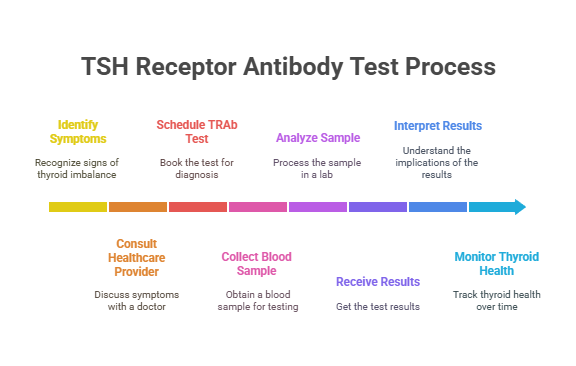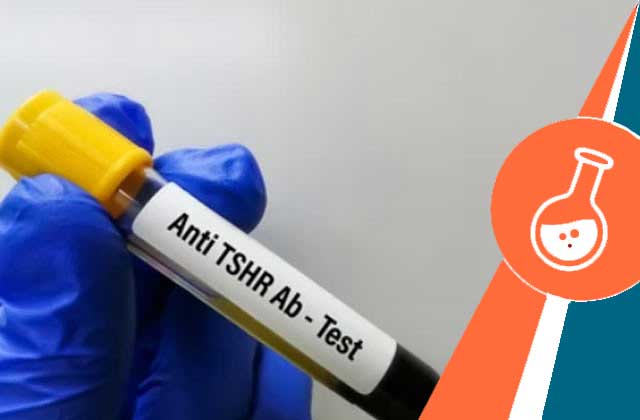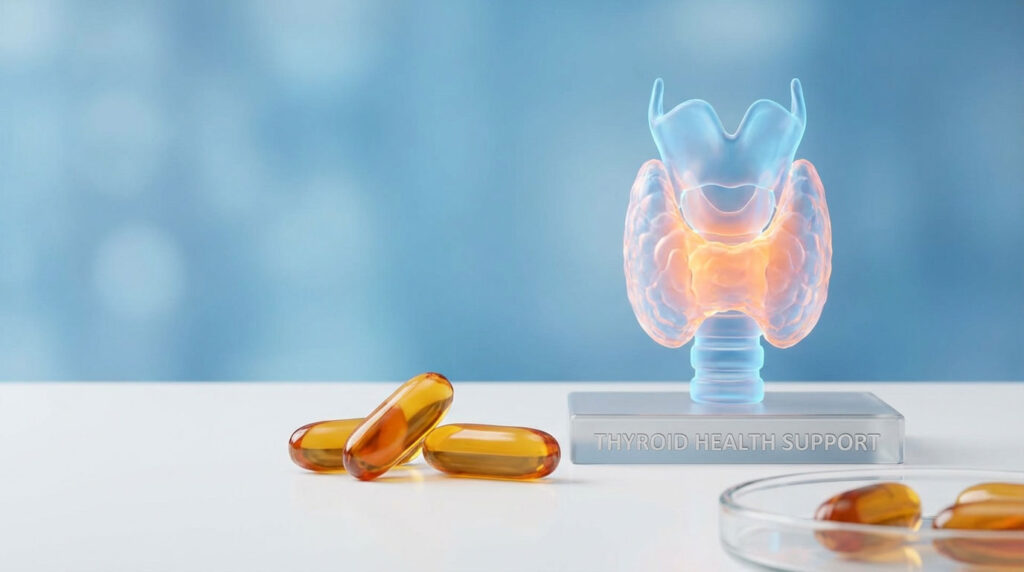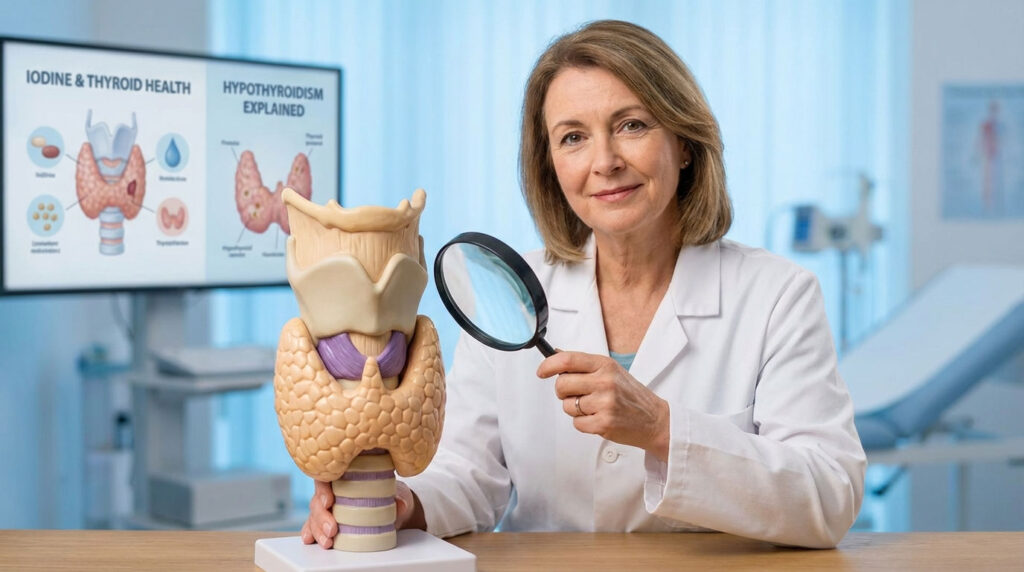
TSH Receptor Antibody and its Function
TSH receptor antibodies (TRAb) are autoantibodies that target the thyroid-stimulating hormone (TSH) receptor present on thyroid cells. These antibodies can bind to the TSH receptor and stimulate or block its activity, resulting in various effects on thyroid function.
Conditions that may require TSH Receptor Antibody Test
The TSH receptor antibody (TRAb) test may be required in several conditions where autoimmune thyroid diseases are suspected. Here are some conditions that may warrant a TRAb test:
- Graves’ disease: Graves’ disease is an autoimmune disorder characterized by overactive thyroid function (hyperthyroidism). TRAb, specifically thyroid-stimulating antibodies (TSAb), are typically present in individuals with Graves’ disease. The TRAb test helps in confirming the diagnosis and monitoring the activity of the disease.
- Neonatal Graves’ disease: In rare cases, infants born to mothers with Graves’ disease may develop hyperthyroidism shortly after birth due to the transfer of maternal TRAb. Testing for TRAb in newborns with suspected hyperthyroidism can assist in diagnosing neonatal Graves’ disease.
- Hashimoto’s thyroiditis: Although less commonly associated with Hashimoto’s thyroiditis, TRAb testing may be performed in certain cases where there is atypical clinical presentation or uncertainty in the diagnosis. Hashimoto’s thyroiditis is an autoimmune condition that leads to Subclinical hypothyroidism
- Thyroid eye disease (Graves’ ophthalmopathy): In some individuals with Graves’ disease, autoimmune inflammation can affect the tissues around the eyes, causing symptoms such as bulging eyes, double vision, and eye discomfort. TRAb testing may be done in the evaluation and management of thyroid eye disease.
- Monitoring response to treatment: TRAb testing can be useful in monitoring the effectiveness of treatment for Graves’ disease. As the levels of TRAb decrease, it indicates a positive response to therapy.
TSH Receptor Antibody Test Procedure
The TRAb test typically involves collecting a blood sample, which is obtained through venipuncture (drawing blood from a vein). The blood collection professional will clean the area with an antiseptic, usually on the inner elbow or back of the hand, and insert a needle into a vein to collect the blood. The collected blood is then transferred into a test tube or vial.
Interpreting TSH Receptor Antibody Test Results
- Negative result: A negative TRAb result means that no detectable antibodies against the TSH receptor were found in the blood. This suggests the absence of TSH receptor autoantibodies associated with autoimmune thyroid diseases such as Graves’ disease. However, it’s important to note that a negative result does not rule out the possibility of thyroid disorders or other causes of thyroid dysfunction.
- Positive result: A positive TRAb result indicates the presence of TSH receptor autoantibodies in the blood. This suggests the possibility of an autoimmune thyroid disease, particularly Graves’ disease. Positive TRAb results are further categorized based on the type of antibodies detected:
- Thyroid-stimulating antibodies (TSAb): TSAb are TRAb that mimic the action of TSH on the TSH receptor, leading to excessive production of thyroid hormones. High levels of TSAb are associated with hyperthyroidism and are often seen in individuals with Graves’ disease.
- Thyroid-blocking antibodies (TBAb): TBAb are TRAb that block the binding of TSH to the TSH receptor, inhibiting the normal stimulation of the thyroid gland. Low or absent levels of TBAb suggest a lack of inhibition on the TSH receptor, which can contribute to hyperthyroidism in some cases.
The interpretation of TRAb test results should be done in conjunction with other thyroid function tests, such as TSH, T4, and T3 levels, as well as clinical evaluation and symptoms. These additional tests provide a more comprehensive assessment of thyroid function and help guide the diagnosis and treatment decisions.
Treatment for High TSH Receptor Antibody levels
High levels of TSH receptor antibodies (TRAb) are typically associated with autoimmune thyroid diseases, particularly Graves’ disease. The treatment approach for high TRAb levels focuses on managing the underlying autoimmune condition and its associated symptoms. Here are some common treatment strategies:
- Anti-thyroid medications: In cases where hyperthyroidism is present due to Graves’ disease, anti-thyroid medications such as methimazole or propylthiouracil may be prescribed. These medications help reduce the production of thyroid hormones and alleviate hyperthyroid symptoms.
- Beta blockers: Beta-blocking medications, such as propranolol, are often prescribed to manage symptoms of hyperthyroidism, such as rapid heart rate, tremors, and anxiety. These medications help control the effects of excessive thyroid hormone on the body.
- Radioactive iodine therapy: Radioactive iodine treatment may be recommended for individuals with hyperthyroidism caused by Graves’ disease. This treatment involves the administration of radioactive iodine, which selectively destroys the overactive thyroid cells. It helps reduce thyroid hormone production and normalize thyroid function. However, it may lead to the development of hypothyroidism in the long term, requiring thyroid hormone replacement therapy.
- Thyroid surgery: In some cases, thyroidectomy (surgical removal of the thyroid gland) may be considered as a treatment option, especially if other treatments are not suitable or if there are concerns about radioactive iodine therapy. Thyroid surgery can be a curative approach, but it will require lifelong thyroid hormone replacement therapy afterward.
- Management of associated symptoms: Treatment may also involve managing symptoms and complications associated with Graves’ disease, such as thyroid eye disease (Graves’ ophthalmopathy) or dermopathy. This may include ophthalmic treatments, corticosteroids, or surgical interventions as needed.
More Related Tests
Why To Book with HealthCareOnTime

17 Crores+ Samples Processed

World Class Technology Labs

25+ Years of Trust & Experience

Free Home Collection
FAQs Around TSH Receptor Antibody Test
How much does TSH Receptor Antibody Test cost?
The TSH Receptor Antibody Test cost is Rs.1450, although it is now available for Rs.1128 because of the offer.










